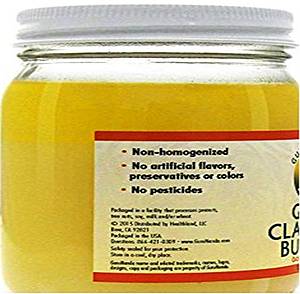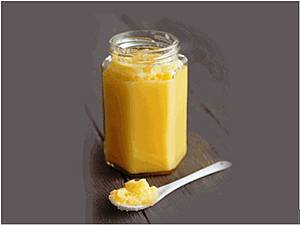RSB Developed Cow Ghee Standard-Learn about the Health Benefits of Quality Cow Ghee to Consumers


Development of animal resources and adding value to derived products was set among national priorities of the Agriculture sector. Subsequently, and considering the importance of Cow Ghee, Rwanda Standards Boards through its Technical Committee RSB/TC 04 on Milk and Milk products developed a national standard on Cow Ghee, RS 294: 2016.
Although it originated in cattle keepers, ghee is commonly known in dozens of countries, primarily in Asia, certain parts of Africa, and throughout the entire Indian subcontinent. Ghee has a rather unique and flavorful taste and aroma that is different from butter, but it can be used in almost all of the same ways. Cow ghee enhances the availability of enzymes responsible for detoxification of cancer-causing substances and decreases the availability of those responsible for activation of carcinogens. Ghee majorly consists of milk lipids and richest source of milk fat of all Dairy products. The constituents of ghee tend to vary with the method of its manufacture. Chemically ghee is a complete lipid of glycerides, 97-98% triglycerides. Small amount of di-and mono-glycerides are also present in traces.
Health benefit of Ghee (Clarified Butter)
Some of the most impressive benefits of ghee include its ability to protect your gastrointestinal system, balance your cholesterol levels, provide additional energy, reduce inflammation in the joints, eliminate certain allergy concerns, protect you from various chronic disease, improve your eye health, strengthen your immune system, and even prevent certain types of cancer.Ghee has a distinctive, fragrant, nutty flavor that smells amazing! Especially while cooking. The purity of ghee itself allows it to penetrate and nourish the body as it passes through the lipid membranes of cells. Because of this, eating food cooked in ghee will draw the vitamins and minerals from the meal deep into the body where it can be of most benefit. Not only that, when you add spices to ghee when cooking, that flavor is carried into the food. Many herbal preparations use ghee as the carrier oil because of these unique characteristics.
Ghee is extremely rich in good fats. Fat tends to have a bad name in most of today’s world, but healthy fats help preserve cell membrane structure, enabling proper immune system function and nutrient absorption.
This leads to the incredible effect ghee is said to have on mental health. Ghee can restore balance to the mind and enhance brain function. Modern scientific research is now revealing that negative emotions are chemical in nature. Ancient cultures have been telling us that for years: the mind and body are one. These chemicals (emotions) are attracted to and stored in, guess what? Fat! The great news is, ghee can be used to replace those fats. Plus, if used properly in a cleanse, ghee can pull out these emotional toxins so they can be cleansed from the body.
Have you ever felt sluggish or bloated after eating oily food? Unlike many other oils and butters, ghee greatly improves digestion by stimulating the secretion of stomach acids. This helps increase the absorption of other nutrients, including the vitamins present in the ghee itself! Moderate, long-term consumption of ghee can help treat ulcers, acid reflux, constipation, heartburn and other digestive issues. With its light nature yet high content of vitamins, athletes can use ghee as a consistent energy source.
Ghee is great for skin! It helps to promote a healthy glow from the inside out. It helps to keep mucous membrane and skin cells healthy and prevent cell damage. One serving of ghee contains around 1,418 units of vitamin A, which is 28 percent of our recommended daily intake. Vitamin A, which is lacking in other edible oils, is nicknamed the “medicine of the immune system.” One serving of ghee also contains 1.3 milligrams of vitamin E. Vitamin E is an essential cancer-fighting antioxidant! Not only that, ghee has four micrograms of vitamin K, which plays a key part in blood health.
Burned yourself while cooking or laying out too long at the beach? Many people still believe you can put butter on burns to soothe it. Try it and you'll quickly learn that butter keeps the heat in and hurts. That's not the case with ghee, which can be used successfully on burns to assuage pain and enhance healing.
Considering the importance of Cow Ghee, Rwanda Standards Boards through its Technical Committee RSB/TC 04 on Milk and Milk products developed a national standard on Cow Ghee, RS 294: 2016. All players in milk sector are encouraged to use standard in preparation of cow ghee to ensure efficiency and effectiveness in production and along the whole value chain. Such good practices contribute in increasing productivity and competitiveness on local and global markets. For the consumers standards constitute an assurance of their protection against unsafe products, services and limit the presence on the markets of misleading products which may confuse them.